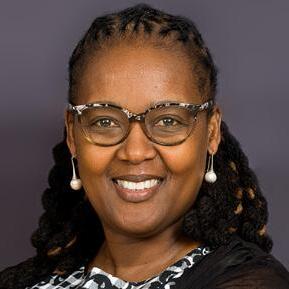
6 minute read
Women Leading The Way In Tech Transformation
Reshaping South Africa’s Approach To Innovation, Inclusion, and Progress
By Thulani Dube, Head of Innovation and Advancement, Cornerstone Institute
While noticeable strides have been taken to drive inclusivity and gender parity within the technology industry, we have to continually ask ourselves what meaningful inclusion looks like in a country with a history of engineered inequality.
The tech space in South Africa continues to be shaped by visionary women striving for digital innovation and inclusive leadership. It becomes imperative for female tech leaders like tech social entrepreneur Baratang Miya to emerge and challenge norms, as well as build bridges for future talent. While leaders must have a presence so as to take up space, it is also important for them to create spaces for future generations to follow, something that Baratang has continually done, making her endeavours align with the United Nations Sustainable Development Goal 5 focused on promoting women in achieving gender equality and empowering all women and girls.
Recently at a Transformation and Empowerment focused conference, Dr Simamkele Dlakavu, a lecturer on Gender Studies, asserted that the current gender inequality in various industries is by design and therefore needs leaders who will be intentional when it comes to issues such as women employability and equity. Leaders in the technology space must therefore make equity a core strategic priority and not another HR buzzword, whilst actively challenging entrenched systems and cultures in order to inspire a shift in organisational mindset around gender, power, and value.
The gender gap in South Africa’s Information and Technology sector reminds us that transformation requires more than policy, it demands intention and action. As of 2024, women account for just under 40% of the ICT workforce. While that figure signals some movement, it is far from parity and even further from power. The problem starts early where only 13% of STEM graduates in South Africa are women, a sobering contrast to the global average of approximately 35%.
This limited pipeline of talent feeds directly into an even more exclusive leadership tier. Notably just 5% of ICT CEOs in South Africa are women, and across all JSE-listed companies, only 14% of CEOs are female. At board level, women hold only 20% of director positions, and top executive roles sit stubbornly at 17% female representation. These aren’t just numbers,they’re symptoms of a system that wasn’t designed with women in mind.
Women Redesigning The Future and Paving The Way for Others to Follow
Amid these structural imbalances, a generation of formidable women is rising to redesign the future from within. Leaders like Naadiya Moosajee, engineer and co-founder of WomEng, are not only breaking barriers - they’re building frameworks for thousands of women to follow. Through her work across Africa, she has become a global advocate for gender equity in STEM, ensuring that young women don’t just enter the field but thrive within it.
Equally inspiring is Mpumi Madisa, CEO of Bidvest Group and the first Black African woman to lead a JSE Top 40 company. Her ascent signals what’s possible when competence meets opportunity and when corporate South Africa embraces inclusive innovation. Basani Maluleke, former CEO of African Bank, brought a bold voice to the fintech space, illustrating the power of representation in reimagining financial services for a broader, more inclusive economy.
And then there’s Emma Mphahlele, whose journey from rural Limpopo to international tech stages defies the limits historically placed on girls in underserved communities. Through initiatives like Kids Innovate Africa and African Youth Ignited, she is championing access, neurodiversity, and digital empowerment for girls and differently-abled youth alike. As a TechWomen alumna and UN Women-endorsed facilitator, her mission is not only deeply personal but structurally transformative. These women are more than outliers, they are architects of change. Their journeys stand as living proof that while the system may not have been built for women, it can be reshaped by them.
Collectively Building an Ecosystem of Transformation Across Sectors
The growing influence of women across key sectors is reshaping South Africa’s approach to innovation, inclusion, and progress. In government, women leaders are playing a crucial role in shaping the country’s digital transformation agenda through expanding broadband access in rural areas and embedding gender-sensitive approaches in ICT policy. Initiatives like the SA Women in ICT Forum and the TechnoGirl Trust are helping to bridge the gap between young talent and future-ready careers, ensuring that girls are not left behind in the tech-driven economy.
In the private sector, leaders such as Nolitha Fakude, Chairperson of Anglo American’s Management Board in South Africa, are at the forefront of embedding sustainability and inclusive innovation into core business strategy. Through her work, she has championed digital upskilling, enterprise development, and gender equity in traditionally male dominated sectors like mining and industrial technology, demonstrating how corporate power can serve as a platform for systemic change. Similarly, the LaunchLab, Stellenbosch University’s innovation incubator, under the dynamic leadership of Anita Nel, is actively nurturing startups, with a focus on tech, agri-innovation, and social impact ventures.
Their support of female entrepreneurs from ideation to investment readiness has made LaunchLab a catalytic force in bridging the gender gap within the startup ecosystem.
Higher education institutions are also key levers in this transformation. Visionary leaders like Professor Pamela Zibuyile Dube, Vice-Chancellor of the Central University of Technology (CUT), are steering universities toward inclusivity and innovation. Under such leadership, institutions become not just academic spaces, but launchpads for female talent in science, technology, and research. By aligning academic output with national digital goals and social equity, such leaders in higher education are helping to redefine what progress looks like as well as who gets to lead it.
Together, across sectors, these leaders are building an ecosystem of transformation.
Not all heroes wear capes!
Women In Tech


















